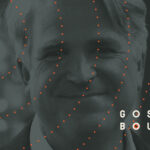This article originally appeared on Russ Ramsey’s blog.
Twenty years ago when I married my wife, I did not know her. And she did not know me. We were two.
We were kids just out of college. I was 22 and she was 21. Neither of us knew much about life outside of the nest. But we knew we wanted to figure it out together—the two of us.
I didn’t know it then, but when it came to our marriage I wasn’t just learning how to be a husband, nor she just a wife. I was learning how to be her husband, and she was learning how to be my wife. Though this would certainly lead us to ways of relating common to any marriage, it would also forge a relationship as unique to this world as a fingerprint.
Our marriage created an empty library, and we were two containers of books out at the curb, waiting to be brought in, cataloged, and shelved. In would come the stories we had been told, the books we had read, and the faith we had been given. In would come her history and in would come mine, along with her comedy and my drama and all of the mysteries that lie between a man and a woman.
When we had brought in all we had, only a fraction of the shelves were filled. Those empty shelves were waiting for what was yet to be written. Slowly but surely, volumes of lamentation, praise, art, humor, geography, vocation, finance, education, home improvement, medicine, Biblical studies, theology, grief, parenting, gardening, and inspiration would find their place among the stacks.
Characters would be introduced and characters would also leave. This, of course, is nothing new. Most of the roads good friends walk in life eventually diverge. There is nothing for it. We can have the closest of friendships for a season, but when a semester ends, or someone moves away, or circumstances change, we find that sense of intimacy tapers off.
There is only one human relationship we come know in this life that is meant by God to be intimate in affection, proximity, and purpose until death itself separates us—the marriage relationship. In marriage God gives a gift of incalculable worth—a sworn partner for life.
We are like two tectonic plates who, by God’s grace, grind away at each other’s rough edges until we fuse together into a brand new nation. My nearsightedness and pride collide with her courage and wisdom. Her woundedness and fear run aground on the shores of my boyish optimism and confidence. And these collisions shape us both.
But when we stood hand in hand at the altar, promising to stay in this covenant for better or worse, in sickness and in health, until one of us died, we knew little of each other’s worlds.
Now, twenty years in however, we know much more. With God as my witness we do.
I know how to make her laugh and I know how to make her cry. I know how to feed her fear and I know how to awaken her hope. I know what keeps her up and what gives her rest. I have the power to hurt her more deeply than anyone else on this planet, as she has with me. We have learned to speak in each other’s native tongue and to see through one another’s atmospheres down to the terra firma.
Yes, we see through a glass darkly and we have much to learn. But we see so much more now than we could have ever imagined was there when we took our vows.
I have fears that are known only to her and my Maker—not because I hide them from the rest of the world, but because they are so nuanced and deep it would take someone who has been at my side for half of my life to know their triggers and to read them.
There are qualities of beauty and fragility deep inside of her that no one else will ever know in the ways I do, though some I am seeing sprout up in the four children our God has given us.
When I see my children carry my wife’s beauty in them, I understand eternity in ways that never before occurred to me. Parts of us will continue on after we’re gone. Lord, have mercy. Christ, have mercy. Lord, have mercy.
But the truth is that there are also parts of us and our stories we will take to our graves—riches, wonders, inside jokes, sorrows, and prayers no one but she and I will ever know. I imagine every life-long marriage is this way.
This thought—that my wife and I will enjoy a sort of life known only to one another—adds to the sanctity and beauty of our union. Not even our own children will fully grasp who this woman and I have become and are becoming to one another and to everyone else we know because of our relationship.
Lord willing, each of my children will also take on this sort of union one day. And when they do, there will be many facets of their lives I will simply not have access to, nor should I.
But this woman—my wife—is a marvel. And it is a holy honor to have to say that, in many ways, you’ll just have to take my word for it because you will never know what I know.
Though much of what she and I are will continue on in the lives of our children and friends, some of it will burn to the ground when one of us dies. This tells me that the place where I stand with her is holy ground.
I stand in that place where two have become one, and that by the grace of God.
Download your free Christmas playlist by TGC editor Brett McCracken!
 It’s that time of year, when the world falls in love—with Christmas music! If you’re ready to immerse yourself in the sounds of the season, we’ve got a brand-new playlist for you. The Gospel Coalition’s free 2025 Christmas playlist is full of joyful, festive, and nostalgic songs to help you celebrate the sweetness of this sacred season.
It’s that time of year, when the world falls in love—with Christmas music! If you’re ready to immerse yourself in the sounds of the season, we’ve got a brand-new playlist for you. The Gospel Coalition’s free 2025 Christmas playlist is full of joyful, festive, and nostalgic songs to help you celebrate the sweetness of this sacred season.
The 75 songs on this playlist are all recordings from at least 20 years ago—most of them from further back in the 1950s and 1960s. Each song has been thoughtfully selected by TGC Arts & Culture Editor Brett McCracken to cultivate a fun but meaningful mix of vintage Christmas vibes.
To start listening to this free resource, simply click below to receive your link to the private playlist on Spotify or Apple Music.


































